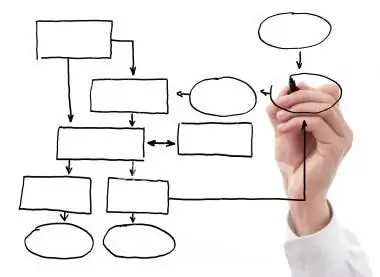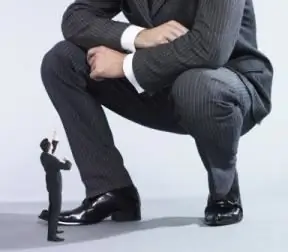2026 Author: Howard Calhoun | calhoun@techconfronts.com. Last modified: 2025-01-24 13:10:29
An enterprise of any form of ownership cannot do without a leader. Who are these people and what are their responsibilities?
Who is a leader?
According to the dictionary of economic terms ("Great Economic Dictionary" by A. B. Borisov), managers are a certain category of workers who occupy positions of management both by the enterprises themselves and their structural divisions. This includes directors (including general directors), managers, chiefs, editors-in-chief and chief scientific officers. This category also includes deputies for the above positions.

In addition, leaders are chairmen, managers, commissars, commanders, foremen, foremen. They also include chief specialists, namely: the chief engineer, chief accountant, as well as the chief mechanic and other "chief" (dispatcher, agronomist, metallurgist, welder, geologist). And, in addition, it is the chief researcher, chief editor and chief economist. State inspectors are also included in this category. And finally, leaders aredeputies for all positions listed above.
What should he do?
What are the functions of a leader? According to the Labor Code, the head is considered to be an individual who manages the organization in accordance with its constituent documents and regulatory legal acts of the Russian Federation. Including it is an executive body in one person. Thus, the head of the organization is both an employee who performs duties under an employment contract and a representative of the company, whose functions include organizational activities and interaction with third parties - participants in civil circulation. In his activities, he must be guided by the provisions of both labor and civil legislation.
At the same time, the title of the position of the head may sound differently at enterprises of different forms of ownership - president, director (or general director). This is not against the law.

Managers decide all issues related to the direct activities of the company, with the exception of those within the competence of the board of directors or the general meeting of founders. He can represent the interests of the company without a power of attorney, issue powers of attorney to other employees, issue orders for hiring, dismissal, and disciplinary sanctions. All norms and rules relating to any employee are applicable to the manager - conscientiously fulfill their own duties in accordance with the employment contract, comply with internal regulations and labordiscipline, as well as labor protection requirements.
Agreement with the head
According to the law, before concluding an employment contract with a candidate for the position of head, procedures may be provided to determine the suitability of the future head of the position. This may be a competition, a request for disqualification, etc. Information about the disqualification of individuals is in a special register maintained by the Ministry of Internal Affairs of the Russian Federation.
Employment contract with a manager can be open-ended or concluded for a fixed period. As a rule, the period of validity of such an agreement is prescribed in the statutory documents of the organization. Usually this period does not exceed five years.
Probationary period for persons accepted by competition for a managerial position is not established. For deputies, senior managers and heads of departments, the probationary period should not exceed six months.
The employment contract of a candidate for a managerial position must include a clause on non-disclosure of confidential information to which he receives access. As well as measures of responsibility for violation of this paragraph.
Head of Department
An enterprise or organization may consist of several structural units. In particular, if the company operates not only at the registered legal address, separate divisions (branches or representative offices) are created. Such territorially remote from the parent organization structural units have the legal right to representthe interests of the firm and organize stationary jobs.

In such a branch, the head of the department is a full representative of the company, having all the necessary powers. His functions are similar to the tasks of the management of the parent company, to which he directly reports. In any structural unit, managers are the organizers of all current activities and specialists in solving a wide variety of emerging problems.
What else does a leader do?
In addition to directly addressing production issues, managers and senior managers are faced with the task of competently maintaining personnel policy. The success, competitiveness, economic stability of any enterprise depends on the efficient work of employees individually and the team as a whole.
Creating a single team capable of working for results is the most important goal of a manager. Thus, the head of the enterprise is also a psychologist who solves the issues of motivation, status and role in the team of individual employees, team rallying.

It is recommended for senior and middle managers:
- Select groups of people who are close in spirit, moral values, religion, etc. Place the workplaces of members of such a group in the office at a close distance. The farther employees sit from each other, the lower the cohesion in the team.
- Encourage common activities and collective decision-making.
- Set specific achievable goals for the group and end conflicts.
- Reward passive employees and discourage over-ambitious ones.
- Preserve and maintain an atmosphere of cooperation and mutual assistance in the team.
Recommended:
Stakeholders of the project. Authors and project leaders

To compete successfully in today's market and be successful in their endeavors, many companies use the project method. It allows you to get a finished high-quality product in a limited time. In order to make this process effective, it is necessary to know its essence, specifics and features of implementation
Internal and external environments of the enterprise. Analysis of the enterprise environment

The management procedure of any organization is a complex cyclical process that requires a clear understanding. It is important to know not only the stages of production, but also to understand what the internal and external environments of an enterprise are, as well as to determine their degree of influence on business entities
Organizational structures of an enterprise - an example. Characteristics of the organizational structure of the enterprise

The implementation of plans and programs is achieved by building an organizational structure that allows you to effectively organize the joint activities of staff through the appropriate distribution of duties, rights and responsibilities. The article highlights the elements of the organizational structure, gives examples of its various types, highlights their advantages and disadvantages
Company "Lukoil": history, leaders, activities

Lukoil has been Russia's leading corporation engaged in oil production and refining for about 25 years. It is worth noting that the company was included in the ranking of the 100 largest brands in the world. These and other interesting facts will be covered in this article
Enterprise income - what is it? Types of enterprise income

The income of an enterprise is the amount of funds received as a result of any activity. There are many varieties and depends on many factors

